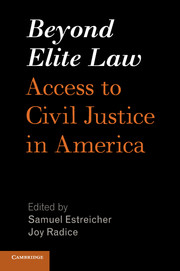Book contents
- Frontmatter
- Contents
- Beyond Elite Law
- Foreword
- List of Contributors
- Overview
- Overview
- PART I CURRENT STATE OF ACCESS TO LEGAL SERVICES
- PART II SOURCES OF LEGAL SERVICES ASSISTANCE FOR WORKING AMERICANS
- 10 Evolution of Legal Services in the United States: From the War on Poverty to Civil Gideon and Beyond
- 11 The Effect of Contingent Fees and Statutory Fee-Shifting
- 12 The Market for Recent Law Graduates
- 13 Clinical Legal Education and Access to Justice: Conflicts, Interests, and Evolution
- 14 Loan Repayment Assistance and Access to Justice
- 15 Federally Funded Civil Legal Services
- 16 New York's Lawyer Referral Services
- 17 Growth of Large Law Firm Pro Bono Programs
- 18 Institutionalizing Pro Bono
- 19 Pro Bono as a Second Career
- 20 Employer-Provided Legal Services for Employment Claims
- 21 Company-Provided Legal Services
- 22 Individualized Justice in Class and Collective Actions
- PART III FASHIONING A REFORM AGENDA
- PART IV CREATING A CULTURE OF SERVICE
- Index
13 - Clinical Legal Education and Access to Justice: Conflicts, Interests, and Evolution
from PART II - SOURCES OF LEGAL SERVICES ASSISTANCE FOR WORKING AMERICANS
Published online by Cambridge University Press: 05 May 2016
- Frontmatter
- Contents
- Beyond Elite Law
- Foreword
- List of Contributors
- Overview
- Overview
- PART I CURRENT STATE OF ACCESS TO LEGAL SERVICES
- PART II SOURCES OF LEGAL SERVICES ASSISTANCE FOR WORKING AMERICANS
- 10 Evolution of Legal Services in the United States: From the War on Poverty to Civil Gideon and Beyond
- 11 The Effect of Contingent Fees and Statutory Fee-Shifting
- 12 The Market for Recent Law Graduates
- 13 Clinical Legal Education and Access to Justice: Conflicts, Interests, and Evolution
- 14 Loan Repayment Assistance and Access to Justice
- 15 Federally Funded Civil Legal Services
- 16 New York's Lawyer Referral Services
- 17 Growth of Large Law Firm Pro Bono Programs
- 18 Institutionalizing Pro Bono
- 19 Pro Bono as a Second Career
- 20 Employer-Provided Legal Services for Employment Claims
- 21 Company-Provided Legal Services
- 22 Individualized Justice in Class and Collective Actions
- PART III FASHIONING A REFORM AGENDA
- PART IV CREATING A CULTURE OF SERVICE
- Index
Summary
Margaret Drew and Andrew Morriss argue that the internal politics of legal education has impeded clinical programs from fully meeting their two primary goals: serving unmet legal needs and preparing law students to be lawyers. As clinics evolved and clinicians fought for equal tenure status, clinical programs experienced a shift from service clinics that provided direct legal representation to issue-based and impact litigation clinics. The authors propose greater integration of clinical legal education and the more traditional law school curriculum to achieve the two original purposes of clinics: to teach students the law and skills in a live-client legal practice, and reverse the trend away from service clinics that fill unmet legal needs.
Virtually everyone agrees that there are large unmet needs for legal services among people and organizations that cannot afford them. Similarly, there is widespread agreement that law schools do a substantially less than perfect job of preparing students to practice law, a role that could be enhanced by expanding the curriculum beyond traditional doctrinal courses to focus on more practical training for the practice of law. Even though opinions differ on exactly how much more practical training law schools ought to provide and how they ought to provide it, blending the doctrinal and clinical perspectives offers a potential solution to both problems: establish law clinics that would enable students to gain live client experience solving real legal problems in courts, government agencies, and organizations, while simultaneously providing additional legal services for the poor and enhancing the practical training of new lawyers. Both these goals were part of the initial impetus for establishing law school clinics in the late 1960s, when clinical education became the reform du jour.
While law school clinics have become an almost universal part of law school course offerings, they have not fulfilled their initial promise to change the face of legal education by making it noticeably more practice-oriented, a result of law schools’ separation of clinical training from the rest of the law school curriculum. Rather than incorporating clinical training into a coherent overall curriculum, law schools have largely minimized the effect of clinical education on non-clinical training. As a result, the impact of clinical legal education on legal education generally has been muted.
- Type
- Chapter
- Information
- Beyond Elite LawAccess to Civil Justice in America, pp. 194 - 217Publisher: Cambridge University PressPrint publication year: 2016



